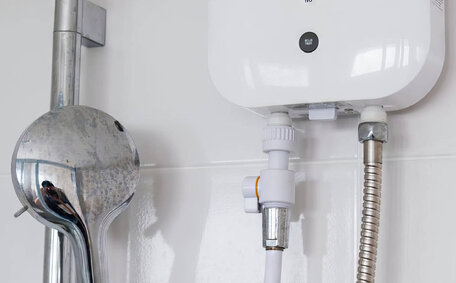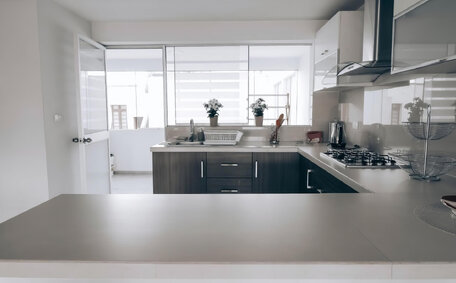What causes kitchen drain blockages?
Blocked kitchen drains often result from fats, oils, and grease solidifying inside the sink’s drain pipes. These cool and congeal, forming obstructions that can completely clog the drains over time.
To effectively address common causes like fat oil blocking your kitchen sink drain, consider the following:
- Food scraps - Coffee grounds, egg shells, and vegetable peels can accumulate and block pipes.
- Hair food particles - Hair, which may entangle within the drain opening, capturing other detritus in the process
- Tree roots - Roots can make their way into cracks and joints in exterior plumbing
- Improper disposal of non-flushable items - Particularly avoid flushing products blended with fat grease, such as paper towels, cotton swabs, and dental thread; they should go in the trash, not down your drain
To keep pipes clear, employ strainers, regularly flush with hot water, and be cautious of what is sent down the sink, particularly oils and greases. Despite maintenance, blockages can happen, which is understandably frustrating. Calling a professional plumber to snake or hydro jet pipes is often the best solution when faced with a severely clogged sink.
How fats, oils and greases clog drains
Fats, oils, and grease (FOG) can solidify in sink drains as they cool, causing blockages. These substances, liquid when hot, cool and harden into solid masses as they move through your kitchen sink’s pipes. These substances can gather and stick to pipe walls, creating a blockage in the kitchen drain.
Pouring grease directly into the drain is not advised as it compounds blockages. Food particles and debris can get trapped in the greasy buildup, resulting in a heavily clogged sink. Eventually, the grease can entirely obstruct the pipe, hindering water and waste flow.
A weekly cup of cooking grease poured down the sink can culminate in a significant blockage over time. Pouring pan oils and fat down the sink is never advised, as it is a key contributor to a drain blocked by fat. Cooling oils and responsibly disposing of fats down the bin averts potential plumbing mishaps.
However, even with thorough habits, unexpected blockages can still occur. Call a professional instead to properly and safely clear blockages.
If faced with a drain that is backed up with grease, do not pour oil or resort to using harsh chemical drain cleaner solutions. Managing oil grease and maintaining plumbing systems responsibly will keep kitchen sink drains flowing smoothly.
Signs you have a drain clogged with grease
There are several clear signs that indicate your kitchen drain may be clogged with grease buildup:
- Water drains very slowly from the sink, sometimes not at all
- Gurgling sounds or strange smells coming from the drain
- Overflowing dirty water coming back up the drain
- Presence of greasy residue around the drain and sink
Such symptoms suggest grease buildup and solidification inside the pipes, leading to worsened blockages and full backups.
Immediate action should do well to be taken as soon as these signs appear to prevent damage and overflows. Trying to clear the clog yourself with drain cleaners is not advised. Call a professional plumber to properly and safely remove the grease accumulation.
Clearing clogged drains
Address grease-related clogs with specific methods. You can attempt the following steps:
- Boil a pot of water and carefully pour it down the sink to dissolve solidified grease. Repeat this process several times, allowing the drain to cool in between.
- Use a plunger to try and remove the blockage by applying pressure. Place over drain tightly and plunge up and down rhythmically.
- Consider using a vinegar baking soda solution to degrade and dissolve the grease that may otherwise stick in your drainage. Follow with hot water to flush the residue.
- You could also try concocting a blend of baking soda vinegar, channelling it through the drains. Allow to sit for a few minutes before flushing with more hot water.
- Consider using grease traps or enzyme drain cleaners which are designed to combat grease and fat, following the instructions on the package.
Avoid abrasive chemical drain cleaners that can damage pipes. Should DIY attempts fail, seek help from a professional plumber. Employing a high pressure water jet system, known as hydro jetting, they can meticulously remove grease deposits from pipe walls.
Preventing kitchen drain clogs
Maintaining kitchen drains free from blockages requires consistent management of fats, oils and greases, pivotal for the health of your plumbing system. Follow these useful tips:
- Wipe dishes and pans with a paper towel prior to rinsing to remove excess oil and protect your drain.
- Collect cooled fats and grease in a sealed container and dispose of it with solid waste
- Install drain strainers to capture food particles and soap scum and stop them from clogging the drain.
- Mix grease with paper or cat litter to solidify it before throwing it in the trash
- Flush pipes weekly by pouring 2 cups of baking soda with 2 cups of vinegar followed by cold water
- Install a grease trap to capture excess fats and prevent them from entering the main sewer line.
Making grease control part of your kitchen routine will help avoid disastrous pipe clogs and backups. But if you’re pondering how clear drains that become completely blocked by accumulations of drain blocked fat, it indicates a serious situation, necessitating a call to a professional plumber immediately.
When to call a professional plumber
Calling a professional plumber is crucial when facing a severe clog or full blockage that DIY methods cannot fix. If attempting boiling water, plungers, drain snakes, or enzymatic cleaners fails to open the drain, this can signify a need to contact a pro right away. Lingering with a fully backed-up pipe can lead to damage.
There are also scenarios when it’s best to call the experts first, including:
- Persistent or repeated drain clogs suggesting more significant concerns
- Noticing cracks or leaks requiring pipe repairs
- Needing professional hydro jetting equipment to scour interior walls
- Requiring camera inspections to identify problem areas
- Sewage overflows creating health hazards
The licenced technicians at Erskine Park Plumbing have the tools, expertise and experience to clear the toughest clogs and identify underlying problems. Don’t hesitate to call 1300 349 338 or email jobs@erskineparkplumbingservices.com.au for urgent assistance or scheduled maintenance.
Environmental impact of oil and grease disposal
Improper disposal of fats, oils, and greases (FOG) in sinks can cause environmental damage beyond clogging pipes. If fats, oils, and grease finds its way down into the sewage system, it can pollute waterways and harm ecosystems.
When comes substances escape through your pipes, they pose a substantial threat to the sewer system, affecting soil and groundwater integrity. Grease can easily stick to the interior of sewer pipes, reducing flow capacity and requiring extensive cleaning to prevent sewage backups.
At wastewater treatment plants, excess FOG hampers operations. Hardened grease clogs equipment and the load can exceed processing capacity. Partially treated sewage may get discharged, polluting rivers, lakes and oceans.
Understanding how prevent FOG from intruding your drains guards both domiciliary plumbing systems and communal facilities against environmental harm. Follow these responsible practises:
- Pour cooled cooking oil into a solid container and throw it in the rubbish bin
- Use a paper towel to wipe plates and cookware before washing to prevent grease from going into drain
- Install sink strainers to catch food scraps
- Limit use of garbage disposals which should never wash debris into pipes
Incorporating grease management into everyday kitchen habits is vital to prevent the dilemma of a kitchen sink clogged and circumvent widespread environmental contamination. But if clogs still occur, call on the expertise of a professional plumber to clear blockages and diagnose any underlying problems.
Proper disposal of fats, oils and grease
Proper disposal of fats, oils, and greases (FOG) is imperative for avoiding clogged drains and preventing sewer contamination. Here are the best practises to follow:
- Let grease cool and solidify before pouring it into a sturdy container, such as a jar or tin can.
- Use paper towels to wipe down plates, cookware and utensils before washing to remove excess grease and food residue.
- Never pour oil down or any other fats, oils or grease down the kitchen sink or any drain. Always dispose in the rubbish.
- Mix smaller amounts of oil or grease with an absorbent material like coffee grounds or cat litter before putting it into the trash to solidify.
- Check whether your local council has a cooking oil recycling program with free drop-off points.
- Install a fat trap to prevent grease from reaching your plumbing, ensuring regular cleaning and emptying.
Following these simple FOG disposal steps protects home plumbing systems and prevents hazardous sewage contamination. But if kitchen drains become sluggish or clogged, call the experts at Erskine Park Plumbing on 1300 349 338 for urgent assistance.






